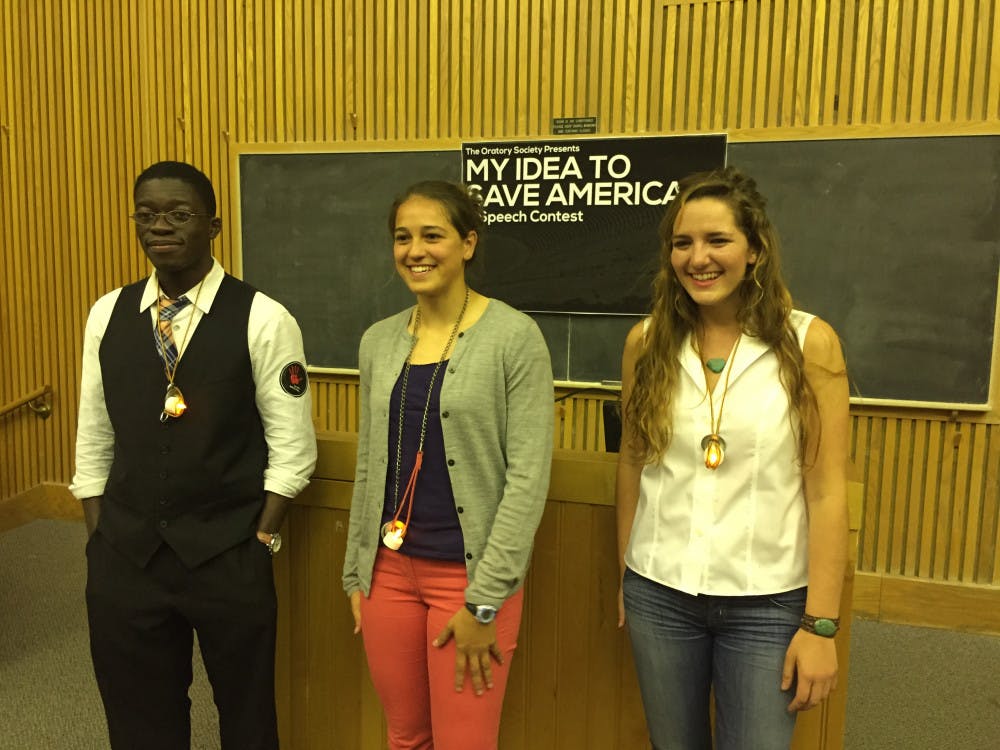“Ethos. Pathos. Logos. Till our last breath.” Thus reads the heading on Middlebury College’s Oratory Society website. The juxtaposition of Greek philosopher Aristotle’s “three persuasive appeals” followed by the latter colloquial phrase encapsulates the unique undertaking of the Oratory Society. Faculty director of the group, Visiting Assistant Professor of Theatre Dana Yeaton described the Oratory Society as “making fun of ourselves as we do something we think is important.”
The Oratory Society unofficially began a few years ago, but truly came to fruition last year in Yeaton’s 2014 Winter Term course, Oratory: A Speechmaking Studio.
Yeaton had noticed an overwhelming nostalgia for oratory practice beyond Middlebury’s campus. He referenced a recent alumni poll that illustrated a desire for classes on rhetoric at the College. The results of the poll showed that public speaking was the skill the College prepared them for the least. Ironically, the poll also showed that speechmaking was the skill alumni found most important in the professional world. Yeaton responded to this absence of and yearning for rhetoric by applying for a grant to establish Oratory Now, a comprehensive program that involves speechmaking trainings and workshops.
“[I wanted] the Oratory Society to seem as if it had been around forever and call attention to a skill that has always been a part of a liberal arts education but has faded,” Yeaton said. “Oratory might be the one thing that business people and people devoted to the liberal arts agree on. They all believe that speaking is critical.”
Committed to making voices heard, the Oratory Society’s mission is simple and compelling. Beyond improving public speaking skills, the group has a social purpose. As articulated on their website: “We believe that when people speak their minds, their community gains confidence in itself, and is strengthened.”
On April 22, the Oratory Society’s dedication to proving the importance of rhetoric to make a persuasive social argument was demonstrated in its “My Idea to Save America: A Speech Contest.” Originally nineteen students auditioned and seven were selected to present five-minute speeches in the final round. The finalists included: Alexa Beyer ’15.5, Dominick Tanoh ’18, Andrew Plotch ’18.5, Nadine Nasr ’17.5, Hannah Blackburn ’17, Charlotte Massey ’18.5 and Conor Simons ’15. Coordinator of the contest Alex Brockelman ’18 explained the purpose of the theme was to give students an opportunity to utilize their oratory skills while presenting an academic and personally founded idea.
“My hope is that with this prompt, regardless of who wins, trying to tackle the larger problems our society faces with concrete solutions is a useful thought exercise and a great opportunity to practice speechmaking,” Brockelman said.
Member of the Oratory Society Debanjan Roychoudhury’s ’16 opening speech playfully announcing to the audience they were “witnessing a contest only the Classical Greeks could compete with,” as well as the addition of a trumpet comically introducing each speaker, the event both an entertaining and thought-provoking experience.
Speeches were judged by three Middlebury faculty members: Russell Leng ’60 Professor of International Politics and Economics Allison Stanger, Professor of Classics Marc Witkin and Visiting Assistant Professor of Dance Trebien Pollard. The judges based their evaluations on three criteria: originality of idea, effectiveness of delivery and persuasiveness of argument. The competition also involved a five-minute critique period conducted by “celebrity respondents” after each speech. Associate Professor of Theatre Alex Draper, Assistant Professor of Dance Christal Brown, and President Emeritus of the Conversation Law Foundation John Kassel were responsible for providing feedback.
All of the competitors proposed engaging youth in political action. Before monetary prizes were awarded, Tanoh was announced the winner of the People’s Choice Award, which had been determined minutes earlier by a secret vote from the audience.
The judges selected Blackburn as the first place winner and recipient of $500. In Blackburn’s speech she argued that “the American Anti-Corruption Act has the potential to stop corruption in our government. Starting with cities and other smaller jurisdictions, the movement can build to states and then Congress.”
Tanoh received second place for his idea to “start the process of fighting poverty by electing a candidate who places a focus on the truly poor, even if it is not politically expedient.”
Third place was awarded to Beyer for her idea, the Heartland Project “a YouTube Series that motivates more Americans to care about the environment by telling better stories.” Beyer expressed feeling a hunger to continue to pitch her idea after receiving such valuable feedback from the respondents.
“As I sat on deck battling pre-presentation nerves, I had one of those moments where I looked around and thought, ‘Gosh. The places Middlebury will lead you,’” Beyer wrote in an email. “I just feel so lucky for the opportunity to participate in something like this.”
Overall, Yeaton sees the future of rhetoric at the College in its students.
“The faculty and the administration agree that oral expression is essential to a Middlebury education. But if you look at the popularity of The Moth, TEDxMiddlebury, Verbal Onslaught, Poor Form Poetry, etc. it’s clear the real energy is with the students. They want to work on their speaking. They want to hear each other speak.”
Oratory Society Holds Annual Speech Competition

Comments


